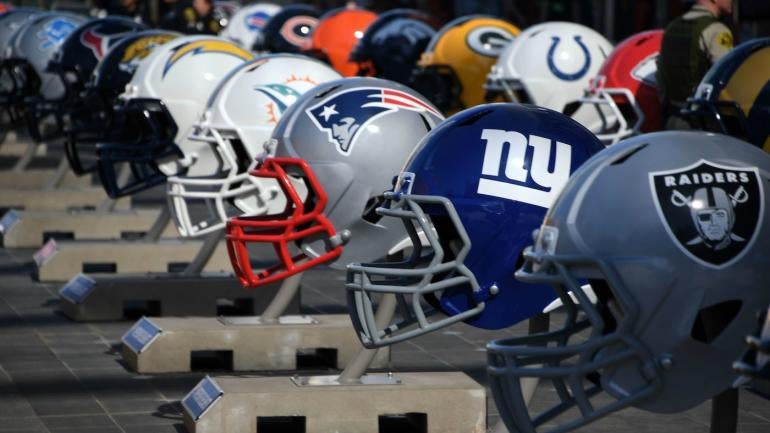
If I've learned one thing from sitting on my couch and watching 112 hours of sports over the past nine days, it's that the NFL might want to start re-thinking its plan for the 2020 season. Unlike the NBA and NHL, the NFL has decided not to put its players in a bubble this year, which is the same plan that Major League Baseball implemented, and if you've been watching MLB, you've probably noticed that it's been nothing short of a disaster.
In Major League Baseball, more than 30 games have already been postponed and that's mainly because one team -- cough, the Marlins -- is single-handedly trying to get the sport shut down (The Cardinals also aren't helping out very much). The good news for baseball is that it's pretty easy to reschedule any game that gets postponed, which means the Marlins (and Cardinals) will likely be able to play a full schedule even though half their rosters have came down with coronavirus.
Unfortunately for the NFL, things won't be as easy in the rescheduling department if a team comes down with dozens of cases of COVID-19. Although the NFL does have a few contingencies built into the schedule this year, the fact of the matter is that those contingencies aren't going to solve every problem that comes up.
Here's a quick look at those contingencies:
- All teams playing each other in Week 2 have the same bye week, which allows the game to easily be rescheduled if it has to be postponed.
- Week 3 and 4 have no divisional games, which means the NFL could conceivably cancel both weeks if there's some sort of outbreak.
- Every team has two home games and two away games over the first four weeks, which means if the first four weeks of the season had to be canceled all 32 teams would still have the same amount of home and away games.
Despite those contingencies, there are still a lot of questions the NFL hasn't answered. For instance, what happens if the dozens of players on a team all test positive for the virus on the Friday before any game played after Week 4? Will the NFL simply postpone the game until January or scrap them entirely?
Also, what happens if a team tests positive AFTER a game? That would conceivably mean that not only would the positive testing team have to isolate, but their opponent would have to isolate as well, knocking out two teams for the following week. Basically, if baseball has proven one thing, it's that one team can wreck a season and football simply isn't equipped to rebound from that if it happens.
If I were running the NFL, I'd fix things by completely revamping the 2020 season plan, and here's how I'd do it (you can also listen to me explain it on the Pick Six Podcast, listen below and be sure to subscribe here).
First, remember that schedule that the NFL released in May? I'd toss it out the window. We don't need it anymore. The remodeled schedule will chop the season down from 269 games (including the playoffs) to 222 games. Although networks won't be thrilled with the thought of losing that many games, I've added a few wrinkles that should make up for the lost inventory.
Right now, the NFL has so many questions to answer that Odell Beckham doesn't even think the league should be playing this year, so let's see if we can change his mind with this completely revamped regular season.
So what will this revamped schedule look like?
Let's check it out, and Roger Goodell, if you're reading, please feel free to steal all of these ideas.
Regular season
The first big change here is that the regular season will only be 12 games long. Another major change here is that AFC-NFC matchups will be completely scrapped from the schedule because it doesn't make sense to have those games during a shortened season.
With those out of the way, here's what the rest of the regular season will look like:
Week 1 thru Week 7: Division games only. Every team will play each divisional opponent twice for a total of six games. For instance, the Chiefs will play home-and-away games with the Raiders, Broncos and Chargers over the first seven weeks of the season. Although this can be done in six weeks, there are seven weeks here for contingency purposes. Each team will get a bye week with every corresponding division taking their bye week together (For example, the AFC North and NFC North would take a bye together in Week 3 followed by the NFC/AFC East in Week 4 and so on). More importantly, the bye week could also be used to make up any games that were postponed due to coronavirus.
Bubble option: Although I'm not necessarily proposing a bubble -- because the NFL seems to be against it due to the complicated logistics -- I do have a bubble proposal. For the first seven weeks of the season, eight bubbles could be created with one team from each division serving as host. For instance, the Chiefs could host the three other AFC West teams over the first seven weeks of the season.
Weeks 8-14: One advantage of being a bad team is that you get a last place schedule, and although my proposed season will only be 12 games long, I think it makes sense to keep the integrity of the last place schedule intact. With that in mind, the second set of six games will look like this: All first and second place teams from 2019 will play all other first and second place teams in their conference while all third and fourth place teams will play all the other third and fourth place teams.
For instance, under this scenario, the Chiefs would play the Ravens, Steelers, Patriots, Bills, Texans and Titans. On the other hand, a team like the Bengals -- who finished in last place in 2019 -- would play the Raiders, Chargers, Colts, Jaguars, Jets and Dolphins, who all finished in third or fourth place last year. The Bengals schedule would then be their six division games plus the six aforementioned opponents.
One key part here is that all AFC teams would get a bye in Week 12 while all NFC teams would all get a bye in Week 13. The bye can obviously be used as a bye, but more importantly, it can also be used to make up any games that were postponed after Week 8.
Bubble option: Since the divisional bubble would no longer work for Weeks 8-14, we'd switch the bubble over to the team with the best record from 2019. For instance, the Chiefs -- as defending Super Bowl champs -- would host the bubble that includes the Ravens, Steelers, Patriots, Bills, Texans and Titans. The AFC's third and fourth place bubble would be hosted in Vegas by the Raiders, and that bubble would include the Bengals, Browns, Chargers, Colts, Jaguars, Jets and Dolphins. In the NFC, the 49ers and Rams would host the bubbles (the 49ers get hosting duties because they had the best record in the NFC last season while the Rams would be hosting because they had the best record of any third or fourth-place team in the NFC.
Ladies and gentlemen -- that would be your 12-game regular season.
Just for reference, here's what the Cowboys schedule would look like: Eagles x 2, Giants x 2, Redskins x 2, Saints, Falcons, Packers, Vikings, 49ers, Seahawks. In the AFC, the Patriots schedule would look like this: Bills x 2, Dolphins x 2, Jets x 2, Ravens, Chiefs, Steelers, Titans, Texans, Broncos. I'm only mentioning those two teams because everyone always asks me about those two teams.
Alright, now that we've covered the regular season, let's move on to the playoffs, where things are going to get a little wild.
Postseason
This is going to sound crazy, but in this revamped format, TWENTY-FOUR teams are going to make the playoffs. The NHL is having a 24-team playoff and it makes sense. If you're taking away regular season games, teams don't have a full season to prove themselves, so you should open up the playoffs to more teams. Also, this number isn't completely unprecedented: During the NFL's strike-shortened season of 1982, the NFL allowed 16 of 28 teams into the playoffs (57.1%).
If 24 teams make the playoffs, that means eight teams won't, and this is where things get fun: Instead of having their season end, those eight teams will take part in the first-ever NFL Draft Tournament (I probably should go ahead and get that trademarked now). Basically, this will be an eight-team playoff and the winner of the playoff will get the No. 1 overall pick in the 2021 NFL Draft. The draft tournament would almost certainly get huge ratings compared to a normal regular season game, so networks would likely be on board. The eight-team playoff field would be made up of the teams with the four worst records in the AFC and the teams with the four worst record in the NFC.
Using last year's standings, here's what the first round of the draft tournament would have looked like:
8. Bengals at 1. Browns
7. Washington at 2. Chargers
6. Lions at 3. Panthers
5. Giants at 4. Dolphins
For the draft tournament, conference affiliation would be thrown out the window and all eight teams would be seeded by record.
Now that we have that out of the way, let's move on with the schedule.
Week 15: During Week 15, the only games on the schedule would be the first four games of the draft playoff. This would serve two purposes: For one, it would allow the draft playoff games to pull in monstrous ratings. Also, with the other 24 teams off, it means that any postponed games that still need to be rescheduled can be played this week. If there aren't any games that need to be rescheduled, this week would give every team a bye, which would allow them a chance to be COVID-free heading into playoffs.
Week 16: This is the week where the fun will truly begin. Under the 24-team playoff format, all division winners in both conferences will be given a bye, so four NFC teams and four AFC teams will be off this week. The other 16 teams will play in a format that looks like this: 5 vs. 12, 6 vs. 11, 7 vs. 10, 8 vs. 9.
Using last year's standings, here's what the first round of the NFC playoffs would have looked like:
12. Cardinals at 5. Seahawks
11. Buccaneers at 6. Vikings
10. Falcons at 7. Rams
9. Cowboys at 8. Bears
BYE: 49ers, Packers, Saints, Eagles
All AFC games would be on Saturday and all NFC games would be on Sunday. The reason for this is because I'm adding a crazy wrinkle: The top three teams in each conference would get to PICK THEIR OPPONENT for the next round of the playoffs. MLB proposed a similar rule for their playoffs this year, but they didn't go through with it.
Under this format, after the AFC games are played on Saturday, the four AFC teams that received a bye would get to pick their opponent on Sunday morning in a TV special. The ratings for this would likely be huge and it would give networks a chance to make up for lost games. In the NFC, the playoff picking special would take place on Monday night.
In the scenario above, if all the home teams won, that would leave the Seahawks, Vikings, Rams and Bears. The 49ers would then get to pick their opponent out of those four teams. The Packers would then pick from the three teams leftover, followed by the Saints, who would have two choices. The Eagles would then be stuck playing the team that didn't get picked.
Week 17 (Jan. 2-4): Welcome to the second round of playoffs. The top four seeds in each conference will play in this round after getting two weeks off. There would be a total of eight playoff games with the four AFC games played on Jan. 2 and the four NFC games played on Jan. 3. This week will also feature the semifinals of the draft playoff, with both games being played in a double-header on Monday night.
Week 18 (Jan. 9-10): This would usually be wild-card weekend, but this year it's basically the divisional round, because there are eight teams left with four AFC teams still alive and four NFC teams still in it. The two AFC games would be played on Saturday while the two NFC games would be played on Sunday.
Week 19 (Jan. 16-17): This would be a huge day on the calendar and that's because it would be the draft playoff championship. The winner of this game would get the No. 1 overall pick with the loser getting the second pick. This game could have been played in Week 18, but both teams were given a bye so they would have ample time to recover from any potential COVID cases.
Also, as part of the baked-in contingency plan, any playoff game from Week 18 that had to be postponed due to COVID can be rescheduled for Week 19.
Week 20 (Jan. 24): AFC and NFC Championship. This one is self-explanatory. The four winning teams from Week 18 will play each other on Championship Sunday. One thing to note is that all four teams will have had a bye in Week 19 going into this game, which will give them time to recover from any positive COVID-19 tests.
Super Bowl (Feb. 7): After the wildest regular season in NFL history, the Super Bowl will finally be played on Feb. 7 in a game that will be televised on CBS.
And there you have it: The NFL season ends with 222 games being played, a draft tournament that ends with someone winning the top overall pick and a primetime TV special where eight teams get to pick their playoff opponent. It's the NFL season you never knew you wanted.
Emergency plan
If the NFL decides that it does need a bubble for the entire season, they could set one up for each conference. The NFC would be sent to Southern California, where the 16 teams in the conference would have access to multiple NFL-caliber stadiums. Within 300 miles of Los Angeles, you conceivably have six stadiums to use, including SoFi Stadium, Allegiant Stadium, the Rose Bowl, the Coliseum, Dignity Healthy Sports Park (the soccer stadium the Chargers played in) and the Chargers old stadium in San Diego.
As for the AFC, that conference would be sent to Indianapolis. Indy has proven year after year at the combine that it has the structure to create a bubble containing thousands of people. The other advantage of Indy is that it has seven NFL-caliber stadiums within a 300-mile bus ride (Indianapolis, Nashville, Cincinnati, Cleveland, Chicago, St. Louis and Detroit).






















